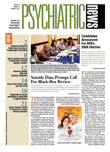In 1998, after 35 years of domestic political violence, the historic Belfast Agreement was signed in Northern Ireland. In fact, a Northern Ireland psychiatrist-turned-politician, John Alderdice, M.D., played a key role in brokering the agreement (Psychiatric News, March 19, 2004).
The agreement led to a semblance of peace in Northern Ireland. Today,“ things still rumble occasionally, but generally we are in a very optimistic period,” Orla Muldoon, Ph.D., formerly of Queen's University Belfast in Northern Ireland and now chair of psychology at the University of Limerick in the Republic of Ireland, told Psychiatric News.
Unfortunately, though, the mental health fallout from the 35-year conflict does not seem to be over, a study conducted by Muldoon and by Ciara Downes, Ph.D., in clinical psychology training at Queen's University Belfast, suggested. The study found that as many as 10 percent of people in Northern Ireland and in counties of the Republic of Ireland bordering on Northern Ireland may have posttraumatic stress disorder (PTSD) as a result of the conflict.
In 2004 Muldoon and Downes conducted a telephone survey of 3,000 adults—2,000 in Northern Ireland and 1,000 in Republic of Ireland counties bordering Northern Ireland—who were representative of the general populations in these regions. They wanted to find out how many of the survey respondents had experienced a distressing event as a result of“ the troubles,” which is what people in Northern Ireland and the Republic call the political conflict. Of the 3,000 individuals, 42 percent reported having experienced such an event.
Those 42 percent were then evaluated during the phone survey with the PTSD Checklist to determine whether they had probable PTSD. Ten percent of the 3,000 survey participants had symptoms severe enough to warrant a diagnosis of PTSD, Muldoon and Downes reported in the August British Journal of Psychiatry.
“We were surprised that the prevalence of PTSD appeared to be as high as it was,” Muldoon told Psychiatric News. “There has been an attitude in Northern Ireland for a long time that it is just best to keep going and that 'the troubles' are a background issue.”
Nonetheless, that the prevalence was so high should probably not have surprised them, she indicated, as it was about the same as that observed in other countries with long-term political conflict, such as Israel and Sri Lanka.
Other survey results offered insight into the types of individuals who developed probable PTSD in the wake of “the troubles.”
•
They had been more directly and indirectly impacted by the conflict than other survey respondents had, and the differences were highly significant statistically. In contrast, half the survey respondents had encountered no distressing experiences during “the troubles.” Thus the psychological impact of the conflict did not seem to be distributed evenly.“ Some have suffered not at all, and others have suffered greatly,” Muldoon and Downes noted.
•
They tended to come from economically and socially disadvantaged backgrounds, which is also often the case with persons who develop PTSD in the wake of long-term political conflicts in other countries. Therefore, social and economic disadvantage may increase the risk of developing PTSD, and“ social disadvantage might also increase the risk of engaging with the conflict, thereby increasing the risk of exposure to trauma.”
•
They rated their national (social) identities as significantly less important than did respondents without PTSD. Since other studies have found that Northern Ireland police officers had a strong national identity during the conflict and that Northern Ireland police officers who were exposed to life-threatening situations during this time had a lower prevalence rate of PTSD (5 percent) than this study cohort did (10 percent), having a strong national identity during long-term political strife may help protect people from PTSD, Muldoon and Downes suggested.
•
But even though they tended to have a weak national identity, they rarely considered themselves victims of “the troubles.” Mental health resources in Northern Ireland have been targeted to “victims” of“ the troubles,” said Muldoon. This finding implies that such resources may not be reaching many of those who most need them, she suspects.
The survey findings also have implications for psychiatrists who treat patients for PTSD stemming from long-term political conflict, Muldoon told Psychiatric News. For example, PTSD developing in the wake of long-term political conflict “does not conform to the DSM definition of PTSD, as affected individuals are likely to have been traumatized numerous times. They are also likely to have a poor community-support network if the conflict was ideologically based. They may even have been alienated from their own families and communities for failing to embrace their traditional group allegiances.”
The study was funded by the European Union Peace II Program and the United Kingdom and Irish governments.
